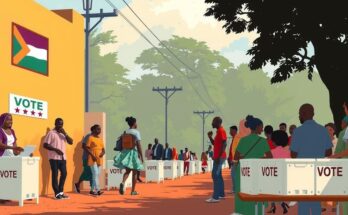Mozambique has experienced significant post-election violence following disputed October 9 elections, leading to at least 30 reported deaths. The situation raises regional concerns, particularly regarding stability, trade, and security in Southern Africa. The unrest underscores political fragility, as countries like South Africa respond by closing borders, which disrupts economically vital trade. Collaborative regional solutions are needed to address the implications of Mozambique’s ongoing instability.
In light of the violent protests following Mozambique’s disputed October 9 elections, the situation has raised significant concerns for the Southern African region. The protests erupted after the ruling Frelimo party, which has maintained power for nearly five decades, was accused of election irregularities. At least 30 fatalities have been reported amid the unrest, prompting fears about political stability and its impact on regional dynamics. With Mozambique being a pivotal player in Southern African trade, the escalation of violence could disrupt economic relationships and exacerbate challenges related to migration and security in neighboring countries. The recent election, which resulted in the Frelimo party’s Daniel Chapo winning amidst allegations of vote manipulation, has drawn criticism from various observers, including the European Union. This situation is compounded by Mozambique’s historical context, marked by a prolonged civil conflict and ongoing security threats from ISIS-affiliated groups. Given that countries like South Africa and Botswana have conducted relatively peaceful and credible elections, Mozambique’s turmoil stands out, posing questions about the future of democratic governance in the region and the implications for its neighbors. The regional economy could suffer greatly from Mozambique’s instability, especially as South Africa has reacted by closing its border with Mozambique, leading to significant economic losses estimated at over 10 million rand per day due to halted trade. The shared geographical and economic ties make it crucial for Southern African nations to address the underlying issues in Mozambique. The unrest signifies not only a struggle for power within Mozambique but also indicates a potential for wider regional implications if left unaddressed. Moreover, Mozambique’s lengthy history of conflict and post-war reconstruction efforts has been hindered by recent security challenges in the north and mass displacement of citizens. The influx of refugees and the pressure on neighboring economies can escalate tensions and provide a fertile ground for further unrest if political solutions are not reached. The Southern African Development Community summit will likely address these urgent matters, as the need for collaborative solutions becomes imperative. In conclusion, the post-election unrest in Mozambique is a pressing concern that resonates beyond its borders. It not only jeopardizes Mozambique’s political integrity but also threatens regional stability, economic coherence, and collective security. An immediate dialogue among Southern African nations is essential to mitigate the potential ramifications of the violence and work toward restoring peace and democratic legitimacy in Mozambique.
The article discusses the recent post-election violence in Mozambique following the October 9 elections, where the ruling Frelimo party was declared the winner amidst widespread allegations of fraud and irregularities. The unrest has resulted in civilian casualties and raises concerns about political stability in Mozambique, impacting the Southern African region. The historical context of Mozambique’s civil conflicts and ongoing security issues further complicates the situation, making regional cooperation crucial to address the challenges effectively. The potential economic ramifications for neighboring countries underscore the urgency of addressing these concerns at the upcoming Southern African Development Community summit.
In summary, the violence following the recent elections in Mozambique threatens not only the country’s political future but also poses considerable risks for the stability and economic health of the Southern African region. With the repercussions likely to affect trade and security, it is imperative for regional leaders to engage in dialogue and seek resolutions to restore peace and uphold the principles of democracy. Failure to address these issues could lead to a broader crisis, impacting millions in Southern Africa.
Original Source: apnews.com




